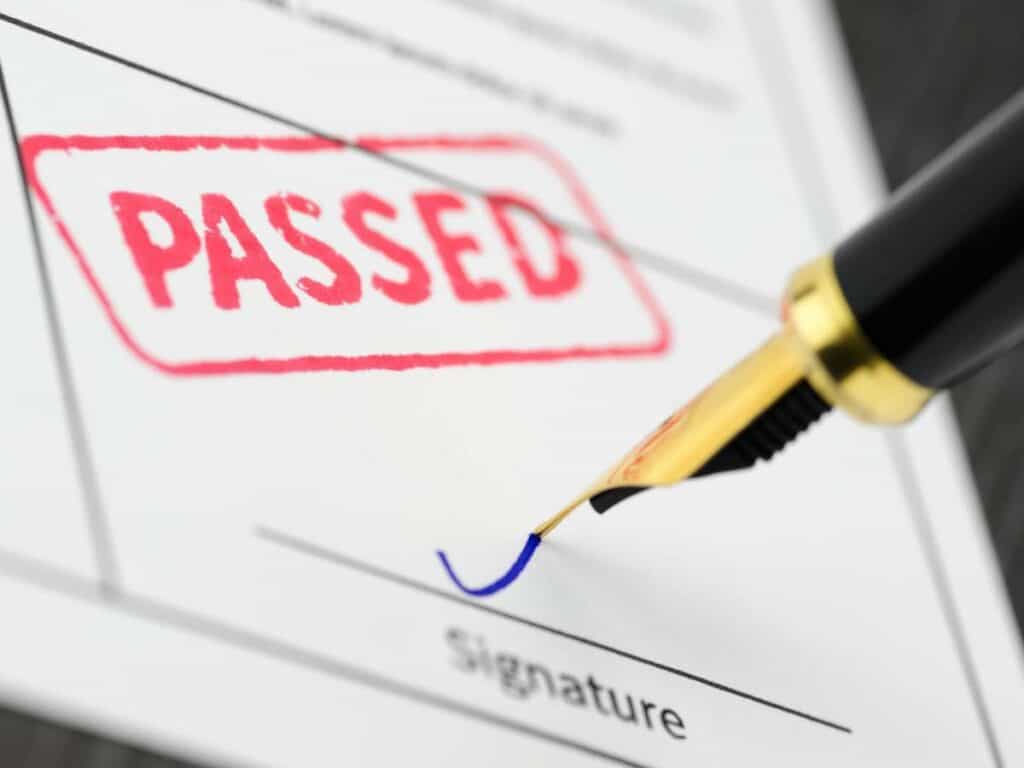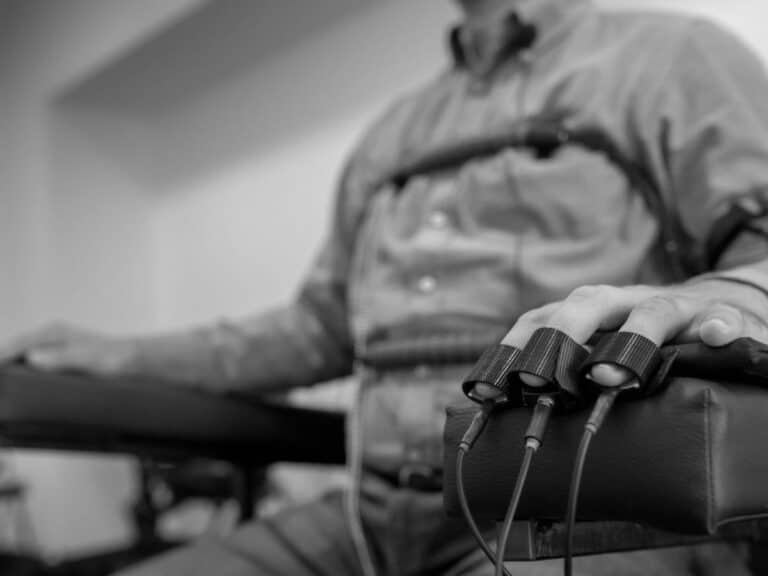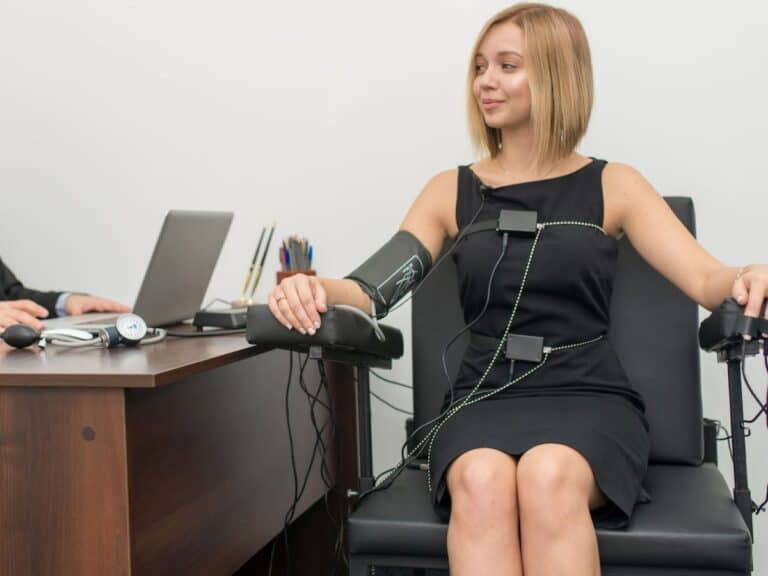How Do You Know If You Passed Polygraph
Equally as stressful as answering yes or no questions while you are hooked up to a polygraph machine is knowing the result of the lie detector test. Do you learn about it straight from the mouth of the polygraph examiner after the question and answer portion or do you have to prolong the agony and wait for some time?
The subject of a polygraph test, the examinee, will know whether he or she passed or failed upon receipt of the examination’s written report. In most instances, it can take for the written report at least 24 hours from the time the lie detector test was taken before it is received by the examinee.
Absolutely hate waiting? Then make sure that you check out this post.
I will talk about some of the most important things you need to know about the result of a lie detector test — how long it takes to complete, when you will see the results, what the possible results are.

How Long Does a Polygraph Test Take
A polygraph examination usually takes anywhere from 2 to 3 hours. Some tests are shorter than 2 hours, while other tests are longer than 3 hours. The length of time it takes to complete a lie detector exam depends on certain factors. They include the reason for the examination and the attitude of the examinee.
Different lie detector tests are conducted for different reasons.
Some of the most common ones are done for the investigation of crimes or misdemeanors and as a part of the pre-employment screening process at some private companies and government agencies.
But then there are also those that are administered for other reasons, such as cheating and infidelity.
In any case, it can take a while for a polygraph test to complete. This is especially true since it consists of 3 distinct phases: the pre-test phase, the test phase and the post-test phase. Of the various phases, the pre-test phase is the most time-consuming. The pre-test phase can be as short as 30 minutes or as long as 2 hours!
How the examinee takes the exam can also affect the length of time for the lie detector test to complete. For instance, constantly asking to have the question repeated or pleading to be given a while to calm down and relax can definitely affect the examination time. A confession, meanwhile, can end the test prematurely.
There are instances, too, where the examiner is the one who’s behind a longer test. Asking a lot of questions or trying to resolve an inconclusive or inconsistent pattern or responses are some sample scenarios.
Will a Polygraph Examiner Tell You If You Failed?
After the test phase of the polygraph examination, the examiner will give the subject an oral report of the test. Since the chart requires evaluation, the examinee will have to wait for the written report to see the results. Some examiners, however, may lie and tell the examinee on the spot that he or she failed in an attempt to elicit a confession.
The stress and anxiety caused by a lie detector test don’t begin and end with answering various yes or no questions during the test phase of the examination.
Once the test is over, you will still have to wait for one very important thing: the result.
During the post-test phase, which follows the test phase where the question and answer portion of the examination takes place, the polygraph examiner will orally provide you with all sorts of information about the test except for the result. In some instances, the examiner may ask you why you reacted in a certain way when answering a specific question.
It’s not unlikely for the examiner to also take a look at the chart and ask additional questions in order to resolve any discrepancies or irregularities in the readings.
Lastly, before you leave the testing center, the examiner will tell you when the written report will get to you.
How Long Until You Get My Polygraph Results
With the exception of extenuating circumstances and non-business days such as weekends and holidays, a polygraph examiner usually receives the written report after 24 hours of the exam. It can take a shorter or longer period of time for the written report to be available, depending on the testing center or polygraph examiner.
Once you are through being strapped to a lie detector machine, there’s another nerve-racking thing you will have to gear up for. And it’s none other than the written report of your examination.
Needless to say, it will indicate whether or not you passed the polygraph test.
It can take at least 24 hours from the time of your exam before you receive the written report in your inbox. That’s because it can take the polygraph examiner a while to analyze your chart and come up with a report. And, particularly if there’s quality control, the result will have to be reviewed by another polygrapher beforehand.
Because of all the things that need to be done in order to derive the result, you will have to wait the following day to get your hands on the written result. At times, you may have to wait longer than 24 hours.
But if the lie detector test is a part of the pre-employment screening process at a private company or government agency, there’s a possibility that you will not get any written report — it will go straight to the employer and you may no longer hear from him or her if you failed the polygraph test and/or meet other eligibility requirements.
What is a Good Polygraph Score
Using the 7-point numerical scale, which the vast majority of polygraph examiners are familiar with, a good polygraph score is any positive number. The best possible good lie detector test score an examinee can get is a +3, which means strongly truthful. On the other hand, the worst polygraph test score one can get is a -3.
The written report of your polygraph test will indicate whether you passed or failed.
However, chances are that you may instead encounter results such as deception indicated, no deception indicated and inconclusive, which can make the report quite confusing.
What you want to get is no deception indicated. That’s because it means that the polygraph examiner found you to be truthful during the test. Meanwhile, you don’t want to get deception indicated, which means that the examiner found you to be deceptive while undergoing the examination.
Inconclusive, meanwhile, means that the polygraph examiner couldn’t find enough evidence as to whether you were truthful or deceptive. Usually, an inconclusive result requires a retake of the lie detector test.
It’s also possible for you to see some numbers on your polygraph exam’s written report.
Those numbers can range anywhere from -3 to +3. There are a total of 7 numbers within the said range, which is why the said scoring system used by most polygraph experts is referred to as the 7-point numerical scale. The differences in the readings between the responses to relevant questions and control questions are assigned a number.
As mentioned earlier, good scores when the 7-point numerical scale is used are positive numbers. But the best possible score is, of course, the best possible highest positive number, which is +3.
Let’s take a look at the meaning of each of the numbers in the said polygraph scoring system:
| POLYGRAPH SCORE | MEANING |
| -3 | strongly deceptive |
| -2 | deceptive |
| -1 | somewhat deceptive |
| 0 | neutral |
| 1 | somewhat truthful |
| 2 | truthful |
| 3 | strongly truthful |
Just Before You Check Whether It’s a Pass or Fail
For you to know if you passed your lie detector examination, you will usually have to wait for at least 24 hours for the written report to arrive. It’s possible for the written report to get to you in a shorter or longer period of time, depending on the testing center or examiner’s policy and the nature of the test.
A no deception indicated report means that the polygraph examiner found you to be truthful during the test. If the report says deception indicated, it means that you failed the exam.
Related Questions
What is a purposely non-cooperative result?
PNC for short, purposely non-cooperative means that the examinee did not comply with the instructions provided by the polygraph examiner beforehand. It can also mean that the examiner detected that the subject of the test deployed some countermeasures in an attempt to influence the result.
Is an inconclusive polygraph result considered an error?
An inconclusive result is neither a pass nor a fail. Similarly, it’s not considered an error such as a false positive or a false negative. Simply put, an inconclusive result means that the polygraph examiner was unable to reach a conclusive decision (passed or failed) based on the chart.
Read Next: What Does No Significant Response on Polygraph Mean






